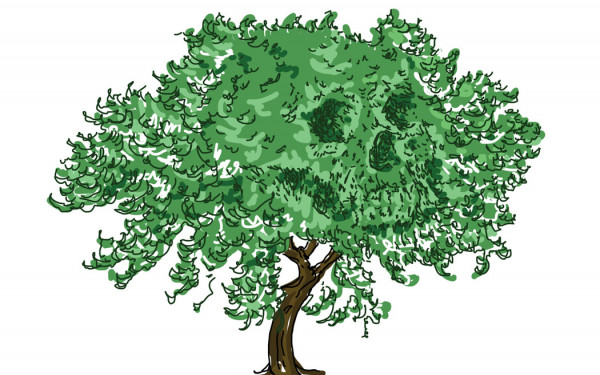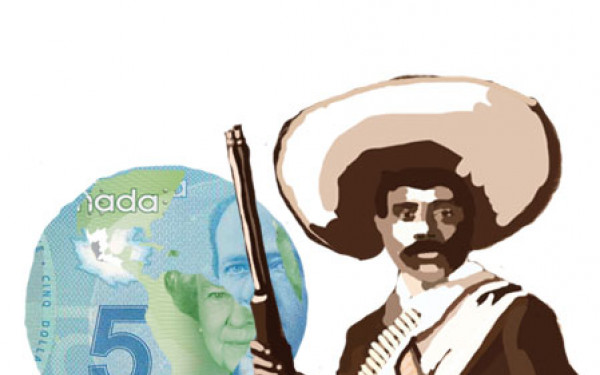Justin, Ya’ Better Follow Through
Will a Trudeau-headed Liberal Government Push For Real Environmental Sustainability?
It’s been a pretty shitty nine years in Ottawa, as far as environmental policy goes.
Take it from Canada’s proverbial trophy cabinet decorated with five Fossil of the Year awards from international climate watchdogs—which former Conservative Environment Minister Peter Kent said we should wear “with honour.”
Take it from my own “unquestionable authority” as a budding “political scientist,” take it from actual scientists, take it from the increasing number of Canadians—without any particular titles or expertise—that named the environment their primary issue going into this election.
Take it from anyone concerned about our ability to live on this planet beyond the next few fiscal years.
Take it from anyone who recognized that the Conservative’s miniscule target of 30 per cent reduction in 2005 emission levels by the year 2030 without any real plan was insulting bupkis.
So, good riddance to them!
But with a new ruling party coming into office under the slogan of “real change,” how much actual change on the environment can we expect from the Liberals?
Prime Minister Justin Trudeau has been in office for just about two weeks. There isn’t too much to base an outlook on, save for promises made in his party’s official campaign platform, and what has been said and done since the election.
As far as action goes, they haven’t been too shabby so far—but it was as easy as reversing some of Harper’s most noxious attacks on research-based policy-making. In particular, integral to a positive direction for environmental policy has been the “unmuzzling” of scientists in the civil service.
It’d be nice not to have to congratulate a government for allowing their experts and researchers to speak freely to the public about what they do, without being chaperoned by state communication handlers or waiting for permission to talk to the media that would often never come. It’d be nice, but as the daughter of a scientist in Ottawa, I’ve gotten the feeling that nice things aren’t always to be expected.
Though maybe at this rate, if we’re lucky, government-approved press releases on the environment won’t be dumped on Friday afternoons at the very end of the weekly news cycle.
Much of the Liberal platform positioned its promises against the legacy of the Conservative regime.
Concerning the environment, the platform pledges to reinvest in environmental water research and monitoring, the National Parks system and wildlife areas after Conservative defunding.
With the reliance of Canada’s energy sector on the oil sands, the most politicized part of any party’s environment platform would be what they have to say about climate change and resource extraction.
Beyond increased investment and bond incentives for clean technologies, the Liberals have also promised to eventually end subsidies for fossil fuel industries, to develop a continental agreement on clean energy and the environment, and the cancellation of the Northern Gateway Pipeline.
Representatives from the oil sands are already voicing their disapproval, which is usually a telltale sign of being on the right track. With the simple change in name from the Ministry of the Environment to the Ministry of Environment and Climate Change, the CEO of oilfield-services company Mullen Group Ltd., Murray Mullen told the Globe and Mail that this semantic shift was “attacking the energy industry. That’s what climate change is all about . . . it is all about attacking carbon.”
Stéphane Dion, head of newly rechristened Ministry of Foreign Affairs joked that he loved the Kyoto Protocol so much that he named his dog after it.
Dion has already committed to ensuring that climate change becomes a shared priority of the entire cabinet, almost as if it’s some kind of overarching issue that should be implicated across policy portfolios.
Climate change has, unsurprisingly, been flagged as a primary issue for Canadian diplomacy, with the upcoming COP21 climate conference in Paris as the Liberal government’s first opportunity to showcase their intentions on the world stage.
Trudeau has reintroduced group meetings between the federal government, and provincial and territorial governments—abandoned by Harper in 2009—to prepare for COP21, and will be bringing a delegation of sub-state and multi-party representation. It’s all seemingly good stuff, but is it
enough?
One of my favourite consistent sources for internet absurdity is Next Media Animation,
a Taiwanese news subsidiary which summarizes international events through CGI, with the kind of animation quality expected for the quick turn-around from story to YouTube.
Their piece on the Canadian elections included Trudeau and Mulcair shooting hockey pucks at Harper to knock him offof a moose, Harper dangling money on a fishing rod while Trudeau rips into a bong and Mulcair waves a rainbow flag and Harper operating a flying, laser-shooting niqab by remote control to scare voters towards the Conservative ballot box.
However, the video still manages to make reference to some shared policy between the leading parties: the English subtitles read, “the top candidates are all in favour of laying pipe of some kind,” while Harper, Trudeau, and Mulcair all swing at each other with sections of pipe labeled Northern Gateway, Keystone XL, and Energy East, respectively. Ultimately, there’s the crux. Each mainstream political party is still mired, to some degree, in the same drive to maintain the status quo. Trudeau is already showing more promise than Harper on the subject of the environment, but not only is that the absolute minimum we should expect from Trudeau, it’s the least we should expect from anyone elected into office.
Put a hedgehog wearing a little tie in the Prime Minister’s seat, and we’d probably still be doing okay. Despite the call to end subsidies and to move towards better energy technologies, a bit more reinvestment isn’t going to shift our energy sector away from resource extraction.
Though Trudeau has pledged to cancel one pipeline project, he and Dion both expressed “disappointment” with President Obama’s denial of Keystone XL, and have offloaded responsibility for outright supporting the Energy East pipeline with faith that corporate-dominated regulatory processes will work in the interest of everyone.
The increased willingness to engage in diplomacy and global conversation on climate change is good, but when was the last time international summits and goalsetting alone has convinced others of the need for drastic change in how we shape our consumption and economies?
Trudeau says he’s waiting to consult with the provinces and territories before developing a climate action plan, but there’s no framework or guarantee that whatever is developed will have any kind of ambition or tangible challenge to business
as usual.
The Liberals have called themselves “Canada’s natural governing party,” and that’s a problem if we consider that the governing of Canada, up until now and before Harper, has never really prioritized the environment in a meaningful way.
If we’re lucky, the Liberals will take advantage of the agitation for change that got them back into power and do something substantial beyond some name changes and redistribution of money. Between systemic change and climate change, we’ll see if they have the moxie to embrace the option that will take a bit more work and courage.






__600_375_90_s_c1.jpg)
__600_375_90_s_c1.jpg)